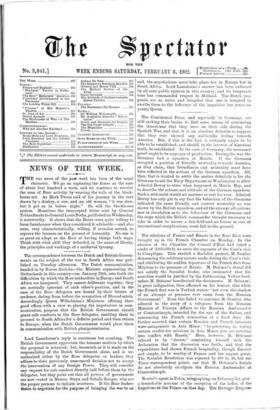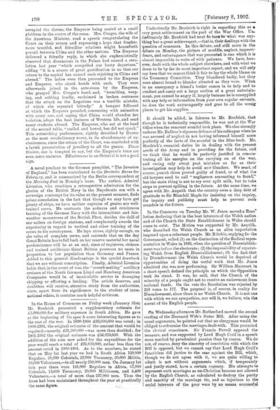Renter's agent in Pekin, telegraphing on February 1st, give a
i•emarkable ,account of the reception of the ladies of the Legations at the Palace on that day. The Dowager-Empress occupied the throne, the Emperor being seated at a small platform in the centre of the room. Mrs. Conger, the wife of the American Minister, read a speech congratulating the Court on their return and expressing a hope that franker, more trustful, and friendlier relations might henceforth prevail between China and the other nations. The Empress delivered a friendly reply, in which she euphemistically observed that dissensions in the Palace had caused a revo- lution last year "which compelled our hasty departure," adding "it is a source of great gratification to us that our return to the capital has caused such rejoicing in China and abroad." The ladies were then presented to the Empress and Emperor, who shook hands with each. They were afterwards joined in the ante-room by the Empress, who grasped Mrs. Conger's hand, and, "trembling, weep- ing, and sobbing loudly, exclaimed in broken sentences that the attack on the Legations was a terrible mistake, of which she repented bitterly." A banquet followed at which the Empress presided, conversing with animation with every one, and saying that China would abandon her isolation, adopt the best features of Western life, and send many students abroad. The Emperor, who sat at the head of the second table, "smiled and bowed, but did not speak." This astonishing performance, rightly described by Reuter as the most revolutionary event, in its abandonment of ex- clusiveness, since the return of the Court, was concluded with a lavish presentation of jewellery to all the guests. Timco Sinicos, one is tempted to say, but the Empress's tears are even more ominous. Effusiveness in an Oriental is not a good sign.











































 Previous page
Previous page